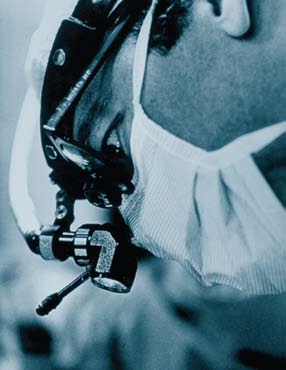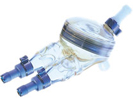

Innovations in cardiothoracic disease treatments are made by surgeons willing to push the limits of current medicine through clinical trials. At the Montefiore Einstein Center for Heart and Vascular Care, surgeons are among the few heart and vascular experts nationwide conducting clinical research.
We are currently enrolling patients in the following clinical trials. For more information on these or any of our studies, contact Roger Swayze, RN at 718-920-2221.
SURGICAL ABLATION VS. NO ABLATION FOR PATIENTS WITH PERSISTENT ATRIAL FIBRILLATION UNDERGOING MITRAL VALVE SURGERY
Cardiothoracic Surgical Trials Network (CTSN)
National Heart Lung and Blood Institute
The study examines the effectiveness of atrial fibrillation ablation during a mitral valve surgery. Surgical ablation of atrial fibrillation create scars in atrial heart tissue that blocks electrical signals, causing the heart to beat irregularly. Candidates for the research trial include patients who have mitral valve disease requiring surgery and atrial fibrillation.
SURGICAL INTERVENTIONS FOR MODERATE ISCHEMIC MITRAL REGURGITATION
Cardiothoracic Surgical Trials Network (CTSN)
National Heart Lung and Blood Institute
This study is designed to determine whether repairing a mitral valve or a heart valve which helps control the flow of blood, with moderate leakage or regurgitation, at the time of planned coronary artery bypass graft (CABG) surgery, will improve health outcomes of those who receive it, compared to those who have the bypass alone. People who have coronary artery heart disease requiring a CABG surgery, and have leakage of the mitral valve may take part in this research study.
MITRAL VALVE REPAIR/REPLACEMENT IN SEVERE CHRONIC ISCHEMIC MITRAL REGURGITATION
Cardiothoracic Surgical Trials Network (CTSN)
National Heart Lung and Blood Institute
The purpose of the study is to determine whether it is better to repair or replace the mitral valve or a heart valve which helps control the flow of blood, in patients with severe mitral valve leakage or regurgitation from coronary artery disease. People who have mitral valve leakage,which is severe may participate in this research study.
AORTIC VALVE OPERATIVE OUTCOMES IN MARFAN PATIENTS
This study observes and compares the two types of aortic valve operations offered to Marfan syndrome patients who need to restore the proper function of their aortic valve: aortic valve sparing surgery or aortic valve replacement surgery. The goal is to determine which operation works better. Valve sparing surgery, as opposed to classic valve replacement surgery with a mechanical valve, does not require a life-long commitment to blood thinning therapy.
MITROFLOW RANDOMIZED SIZING AND HEMODYNAMIC STUDY
The purpose of this study is to compare sizing, implant techniques and hemodynamics between the Mitroflow Pericardial Aortic Valve (bioprosthetic replacement valve) and the Edwards Magna Heart Valve (bioprosthetic replacement valve).
BERLIN HEART

The Children's Hospital at Montefiore offers both left and right ventricular support with the Berlin Heart Device, the only such device specifically designed for children and used in the United States. Montefiore's success in providing mechanical assistance is comparable to the best in the nation, including patients who were treated within the first year of life.
HEARTWARE LEFT VENTRICULAR ASSIST DEVICE FOR THE TREATMENT OF ADVANCED HEART FAILURE (ADVANCE)

The purpose of this study is to evaluate the HeartWare® LVAD system (left ventricular assist device used help a weakened heart pump blood throughout the body) in patients listed for cardiac transplantation with advanced heart failure. The HeartWare device is a third-generation LVAD (newest design).
PROGENITOR STEM CELLS AND LVADS
National Heart Lung and Blood Institute
This study evaluates the benefits of injecting mesenchymal precursor cells known as progenitor stem cells into the hearts of patients with advanced heart failure who have implanted LVADs as a bridge to cardiac transplantation. The study will measure functional status, myocardial function, cardiomyocyte regeneration and neovascularization.
INTERAGENCY REGISTRY OF MECHANICALLY ASSISTED CIRCULATORY SUPPORT (INTERMACS)
National Heart Lung and Blood Institute
This study collects and analyzes clinical and laboratory data and tissue samples from patients using Mechanical Circulatory Support Devices (MCSD) as destination therapy for end-stage heart failure. The development of new procedures and devices to reduce the complications of MCSDs will be expedited by the work of the registry involving the systematic, independent analysis of MCSD implantation procedures and outcomes.
REVERT
The goal of this study is to evaluate the use of robotically-assisted LV lead implantation as a primary strategy for cardiac resynchronization therapy (CRT). Patients will receive CRT by either transvenous left ventricular (LV) lead insertion or robotically-assisted LV epicardial lead insertion. The trial compares the two procedures for both safety and efficacy.
PROGENITOR STEM CELLS AND LVADS
National Heart Lung and Blood Institute
This study evaluates the benefits of injecting mesenchymal precursor cells known as progenitor stem cells into the hearts of patients with advanced heart failure who have implanted LVADs as a bridge to cardiac transplantation. The study will measure functional status, myocardial function, cardiomyocyte regeneration and neovascularization.
PLEURASEAL SEALANT SYSTEM
This study will evaluate the effectiveness of Confluent Surgical's PleuraSeal Sealant System in the treatment and control of intra- and postoperative air leaks, following pulmonary resection via an open thoracotomy (incision into chest wall). The performance of the PleuraSeal Sealant System is compared to conventional surgical techniques such as surgical staples or sutures.
HYBRID REVASCULARIZATION OBSERVATIONAL STUDY
National Heart Lung and Blood Institute
MANAGEMENT PRACTICES AND THE RISK OF INFECTIONS FOLLOWING CARDIAC SURGERY
Cardiothoracic Surgical Trials Network (CTSN)
National Heart Lung and Blood Institute
The purpose of the study is to determine the best ways to prevent infections after heart surgery. The study will only collect information about the care people receive during planned heart surgery. Versus people who have received or are scheduled for heart surgery may take part in this observational study.
Montefiore Einstein Center for Heart and Vascular Care
Office of Research and Clinical Trials
Roger Swayze, RN
Phone: 718-920-2221